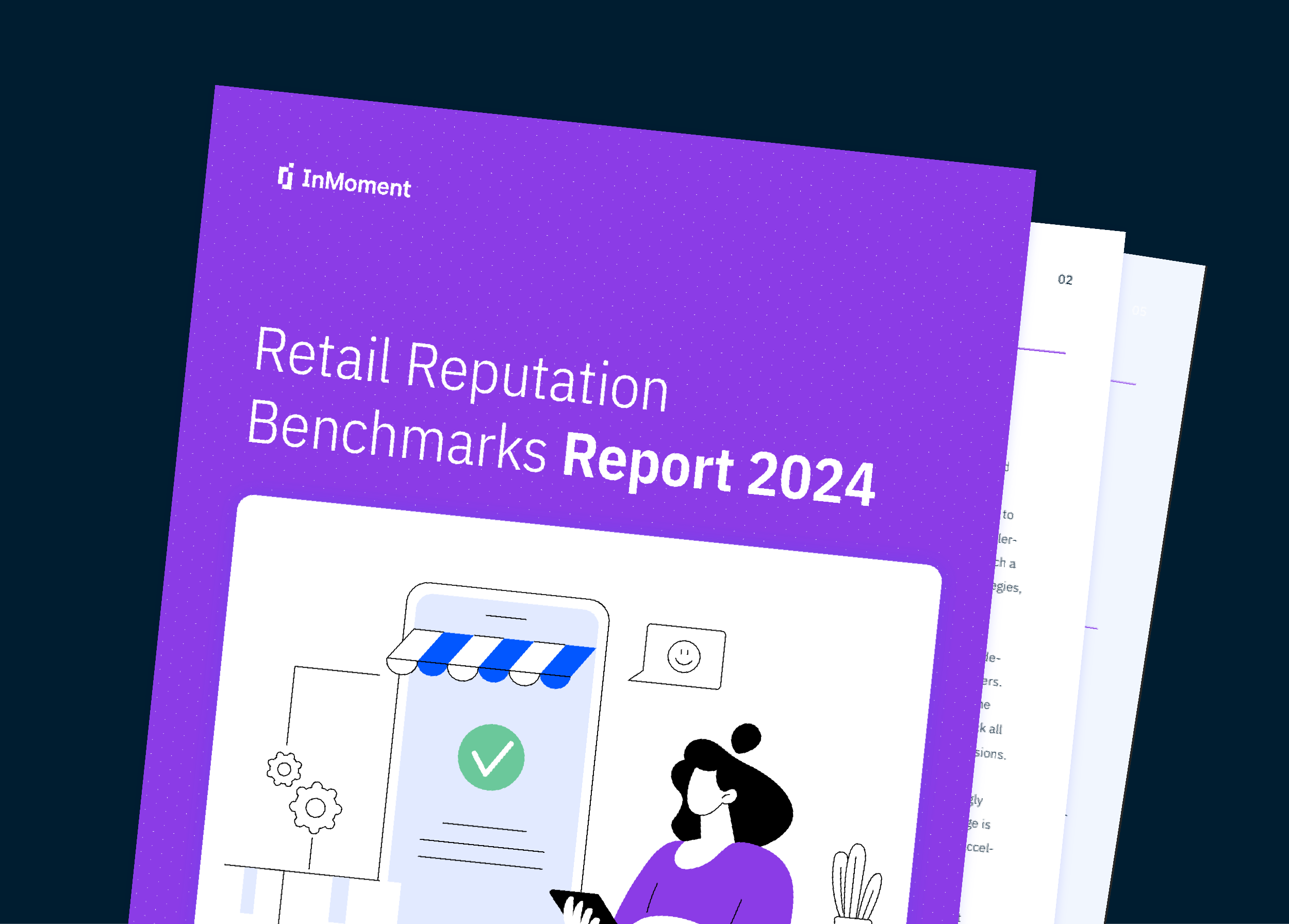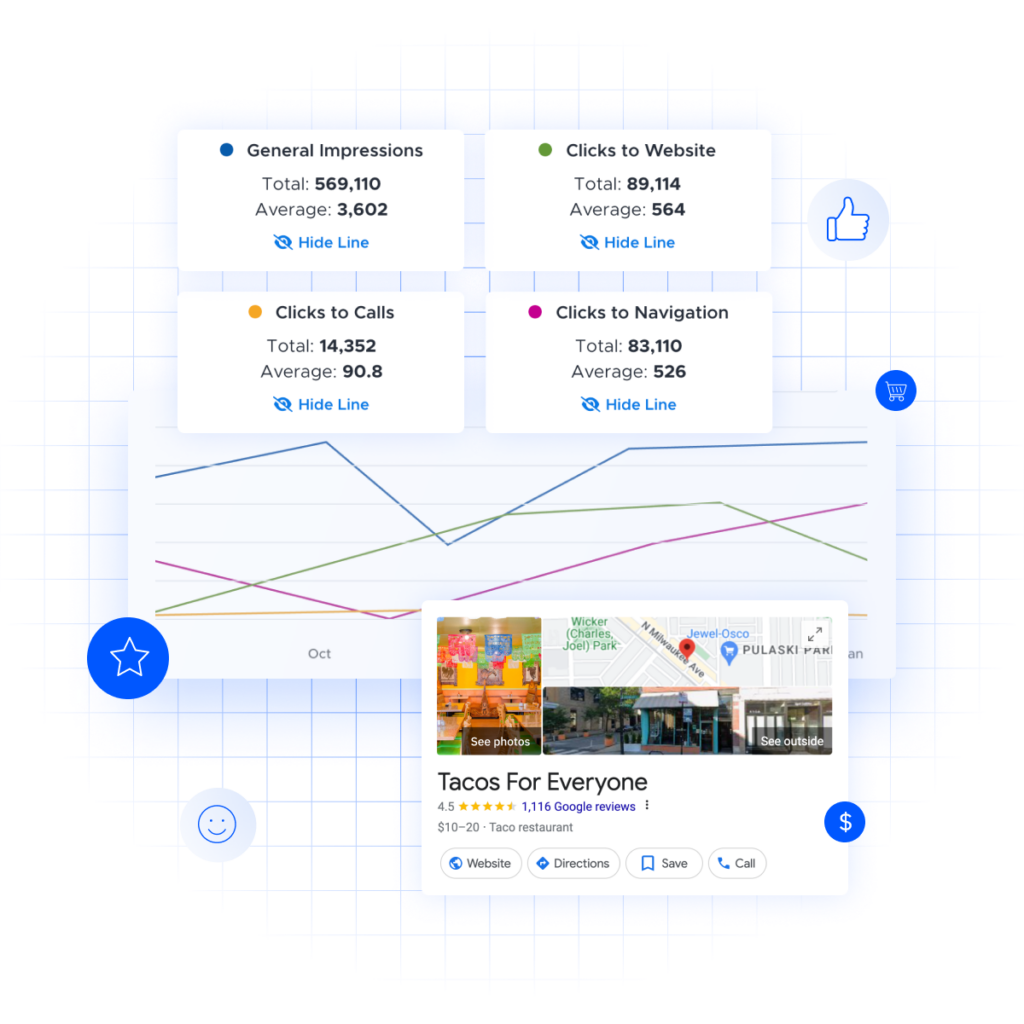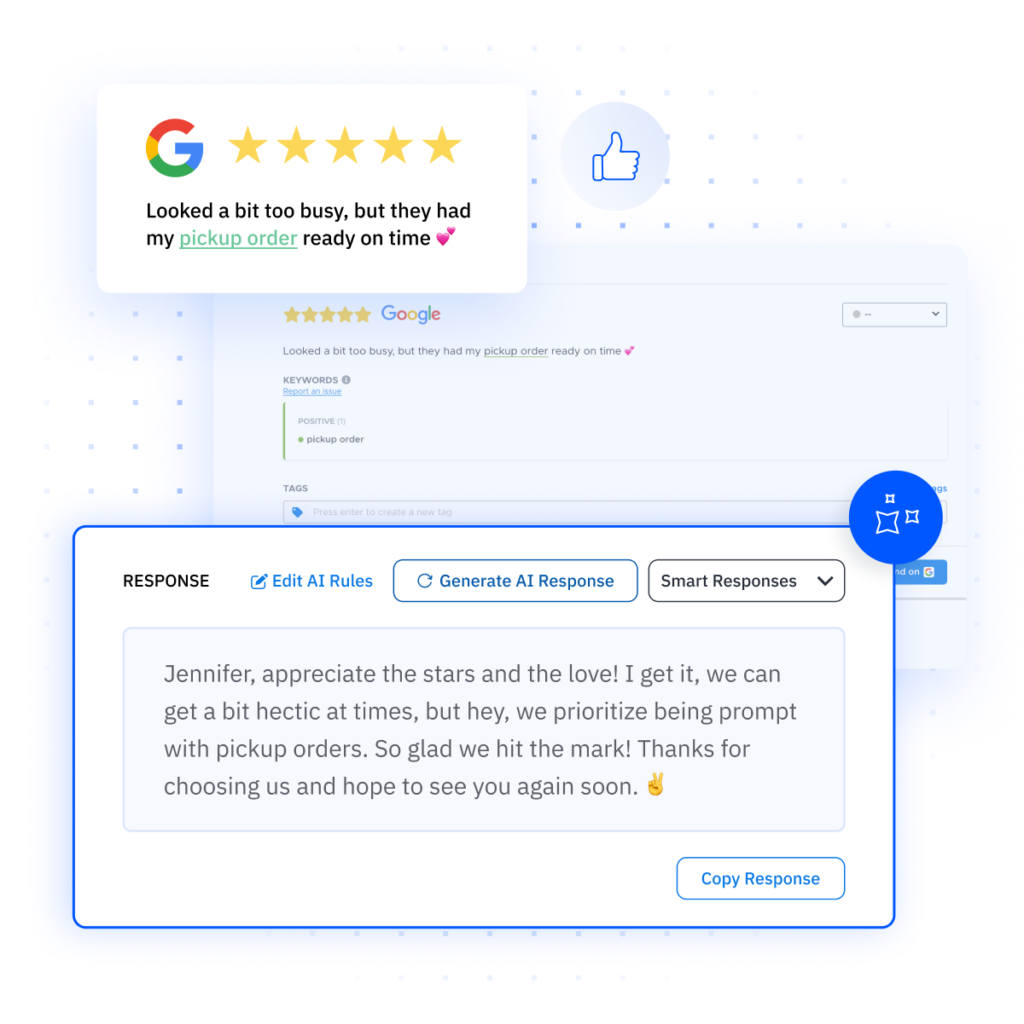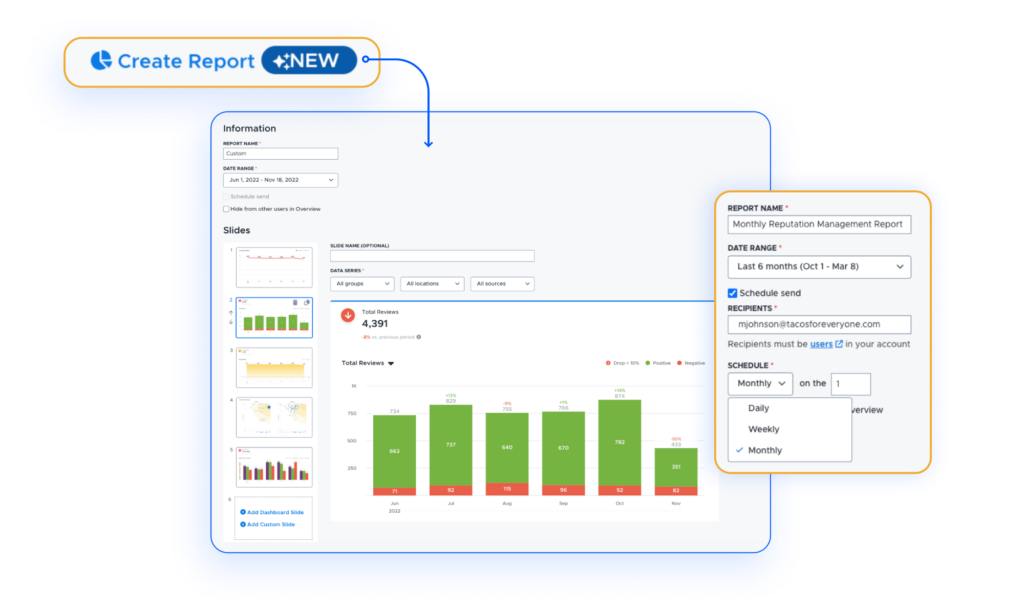It can be argued that reputation management for retail companies is more important than it is in any other industry. Whether you are a local shop, regional staple, or nationwide brand, reputation management is one of the most important marketing strategies you need to master to ensure brand success.
In retail, the power of the review is stronger than ever. Almost all consumers, 95% to be exact, will read an online review before purchasing a product. To manage your reputation and actively use customer feedback in your business operations, you need to implement strategies that are efficient, effective, and scalable.
Why Retail Reputation Management Is So Important
Reputation management for retail companies is so important because it can be directly linked to business performance. Not only does your brand’s reputation account for almost two-thirds of its market value, but a negative online reputation can result in a significant loss in revenue.
Your online reputation is also a significant factor in the way your customers perceive and interact with your brand. Almost 70% of consumers trust the opinions of other consumers more than paid advertisements. Furthermore, 85% of customers would be willing to pay more for a product or service from companies with higher ratings and reviews.
With these statistics in mind, it becomes clear that retail reputation management is one of the most important things you can do to improve customer acquisition, retention, and the overall retail customer experience. These statistics are all fine and well, but how do you execute those strategies across your company?

REPORT
2024 Retail Online Reputation Benchmarks Report
InMoment’s 2024 Retail Online Reputation Benchmarks Report provides a top-level view of the state of reviews today for the retail industry — and how these reviews reflect the experiences retail consumers want to have. The benchmarks serve as a valuable tool for organizations looking to assess their reputational performance, set goals, make informed decisions, and drive continuous customer experience improvement.
5 Retail Reputation Management Strategies for Business Success
Talking about reputation management for retail companies is one thing, but doing it is another. To properly execute these strategies across your business, you need to have coordinated efforts across your entire organization. While that may seem complicated, it might be easier than you think. Here are four reputation management strategies that you can start initiating today to improve your business.
Claim Your Local Listings
By claiming your local listings and having consistent information such as name, address, and phone number (referred to as NAP) across listings sites, your brand will be easier to find for prospective customers and rank higher in search results. This is also an important first step to take in your reputation management initiatives because it will give you the ability to respond to customer reviews.
If your organization has locations numbering in the hundreds or thousands, it would be worth it to invest in a local listing management solution to remain efficient. This would also help you identify which listing sites and online directories matter the most to your business.
Create Location Pages
There are many advantages to building out location pages on your website. For businesses with multiple locations, these pages can act as micro-sites that contain content specific to that location. This will also aid in running targeted campaigns that may only apply to one location.
With locations pages, you are able to track location-specific metrics such as impressions, website, call, and navigation clicks. These will be useful to show the impact of your reputation management and customer experience initiatives.
Location pages also improve local SEO rankings. Because of the specificity of these pages, they will be more relevant to users in the respective geographic locations.

Ask for Reviews
Asking for reviews is a simple way to grow the visibility and reputation of your company. If you are consistently delivering exceptional customer service and putting your customers first, they will more than likely be happy to let others know about their experience. As a matter of fact, 77% of consumers are willing to leave a review if asked to do so.
If prospective customers go onto review sites and see a healthy amount of recent and positive reviews, it will increase social proof and make them more likely to continue down the funnel with your company.
Respond to Reviews
Asking for reviews is important. But, it is even more important to know how to respond to Google reviews. This is not even considered a luxury in today’s market. Customers expect you to respond to their reviews. Take advantage not just to acknowledge positive reviews, but also to resolve negative feedback and rectify any misconceptions or inaccuracies. Doing so shows them that you care about their feedback, and can also strengthen your relationship with your customers.

Showcase Customer Testimonials
Lastly, another great way to improve social proof and brand reputation is by showcasing customer testimonials on your website or even in your store. This is a great way to continue to build brand credibility and customer trust. Sharing real-life experiences from happy customers fosters a sense of community and belonging, as prospective buyers can relate to the positive experiences of others.
How to Improve Reputation Management in Retail
Your retail reputation management efforts do not stop after one big push, they are an ongoing effort that needs to become part of your regular business operations. The leaders in retail reputation management are always looking for ways to improve. For example, retail leaders respond to reviews in a time that is 10% faster than the industry average. While it may seem like a small difference, it goes a long way in showing customers that their feedback matters.
Monitor Online Reviews from Social Media and Business Listings
Monitoring online reviews from various platforms such as social media and business listings is one of the most important ongoing efforts for any business striving to maintain a positive reputation.
By actively keeping tabs on what customers are saying about your products or services, you gain invaluable insights into areas where improvements may be needed and can swiftly address any issues before they escalate.
Positive reviews also serve as powerful testimonials that can attract new customers and enhance brand credibility. Through vigilant monitoring and timely responses, you can effectively manage your online presence and cultivate lasting relationships with your customers.
Engage with Influencers and Local Guides
Harnessing the influence of social media influencers and local guides presents a dynamic opportunity to amplify your business’s presence and reach. Collaborating with influencers allows you to showcase the best aspects of your offerings to a wider audience by leveraging their credibility and reach to endorse your brand authentically.
Similarly, engaging with local guides who share their firsthand experiences can provide authentic perspectives that resonate with potential customers seeking genuine recommendations. The Google Local Guide program, for instance, empowers individuals to contribute meaningful insights and recommendations that foster a sense of community and trust within local markets.
Transform Online Reviews for Better Customer Experience
Turning online reviews into actionable insights is a proactive approach to enhancing the overall customer experience. By analyzing customer feedback, your business can identify recurring themes, pinpoint areas for improvement, and implement targeted strategies to address customer concerns. This not only demonstrates a commitment to listening to customers but also fosters a culture of continuous improvement within the organization.
By responding promptly and effectively to reviews, you can mitigate negative experiences, bolster customer satisfaction, and ultimately improve your online reputation and star rating.
Utilize Reputation Management Software for Retail Companies
For retail companies with multiple locations, managing reputation across various platforms can be a daunting task. Reputation management software offers a streamlined solution that provides a centralized platform to monitor and respond to reviews efficiently. By leveraging automation and analytics, retail companies can gain actionable insights into customer sentiment across different locations, enabling them to make informed decisions to enhance the customer experience.
Integrating reputation management software into your operations streamlines the process and ensures consistency and effectiveness in managing your online reputation.
What to Look For in Retail Reputation Management Software
When choosing a retail reputation management software, your business will have a lot of options to choose from. It is up to you to choose the software that best fits the goals of your businesses. Regardless, certain features are prevalent in all effective reputation management software.
- Review Monitoring: Look for software that can track and monitor reviews across various online platforms, including social media, review sites, and search engines. It should provide real-time alerts for new reviews and mentions.
- Sentiment Analysis: The software should offer sentiment analysis capabilities to understand the tone and context of reviews. This helps in prioritizing and addressing negative feedback promptly.
- Response Management: Look for features that streamline the process of responding to reviews. This may include templates for common responses, scheduling tools, and the ability to respond directly from the platform.
- Analytics and Reporting: Choose software that provides comprehensive analytics and reporting capabilities. This should include insights into review trends, customer sentiment, response times, and the impact of reputation management efforts on key metrics such as sales and customer retention.
- User-friendly Interface: Opt for software with an intuitive interface that is easy to navigate and use. This ensures that your team can quickly adopt the platform and make the most of its features.

By considering these factors, you can select retail reputation management software that meets the standard for performance while also matching your business’s needs.
Win at Retail Reputation Management with InMoment
Deciding where to start on your retail reputation management may seem overwhelming, but InMoment has been helping the world’s leading retail brands improve their reputation management and customer experience for years.
We have helped brands like Foot Locker make sense of large amounts of customer data in order to improve business performance. See what we can do for you by scheduling a reputation management demo today!
References
Luisa Zhou. Online Review Statistics: The Definitive List (2024 Data). (https://www.luisazhou.com/blog/online-review-statistics/). Accessed 3/29/2024.
Gitnux. Reputation Management Statistics. (https://gitnux.org/reputation-management-statistics/). Accessed 3/29/2024.
fera.ai. 59 Online Review Statistics You Need to Know in 2024. (https://www.fera.ai/blog/posts/online-product-review-statistics-ecommerce-stores-need-them). Accessed 3/29/2024.



